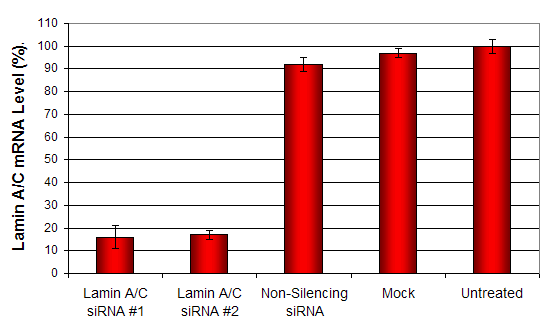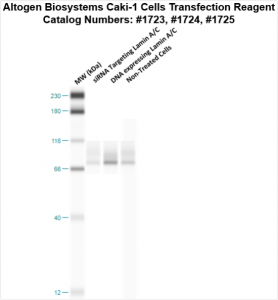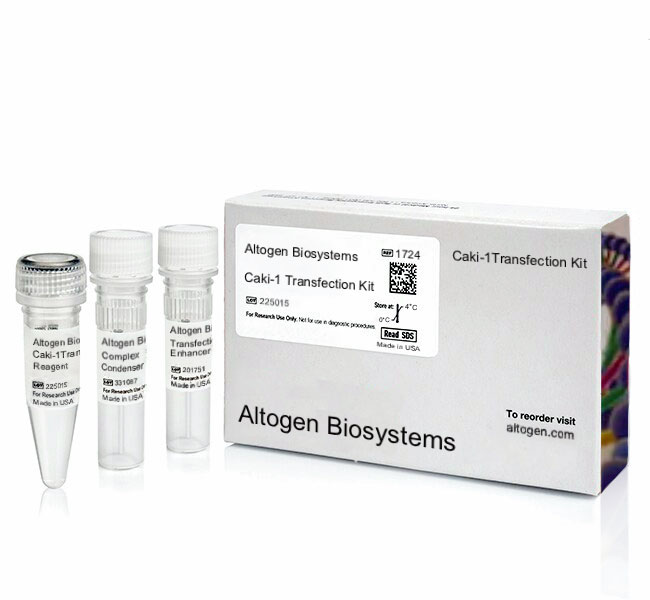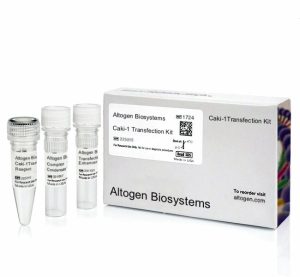Description
Purchase Orders: Click “Add to Cart” button to order, then email PO to orders@altogen.com.
Product Availability: In Stock.
Transfection Reagent for Caki-1 Cells, (Kidney Epithelial Cells, HTB-46)
-
Proprietary cationic lipids formulation
-
High transfection efficiency of small RNA (siRNA, shRNA, miRNA), mRNA, pDNA
-
Effective and robust intracellular delivery
-
Kit includes Transfection Enhancer reagent
-
Produces consistent results, lot-to-lot, plate-to-plate, and well-to-well
-
Work in the presence of serum
-
A proven reagent for establishing stable cell lines
-
Optimized transfection protocols are adapted for use with both standard & reverse transfection methods
-
Download in vitro Caki-1 transfection protocol: [PDF]
- Download Caki-1 CRISPR/Cas9 transfection protocol: [PDF]
- Download PowerPoint presentation for Caki-1 cells transfection kit: [PPT]
- UPC/GTIN/EAN: 860002089739
-
Brand: ALTOGEN®, developed and manufactured by Altogen Biosystems
Transfection Efficiency:
Reagent exhibits at least 80% transfection efficiency of siRNA delivery. Transfection efficiency was determined by qRT-PCR.
Product Description:
Pre-optimized transfection kit for high transfection efficiency of Caki-1 cells, a human renal carcinoma cell line. Transfection reagent is compatible with DNA and RNA transfection.
Transfection Protocol and SDS:
Download Altogen Biosystems Caki1 Transfection Protocol: [PDF]
Download SDS: [PDF]
Caki-1 Cell Line:
According to the American Cancer Society, renal carcinoma is sporadic in young people, with an average patient age being approximately 65 years old. Although the death rates for kidney cancer have slightly decreased, the incidence is on the rise and represents a significant public health problem. Clear cell carcinoma accounts for 92% cases of renal cell carcinoma, which is the most common form of kidney cancer, as per the National Institutes of Health. The Caki-1 kidney clear cell carcinoma cell line exhibits epithelial cell morphology and has proven to be a dependable transfection host. This cell line was established from renal carcinoma cells of a 49-year-old Caucasian male patient with clear cell carcinoma. Caki-1 tumorigenic cells are commonly employed for studying the human proximal tubule epithelium. These cells contain many microvilli, but few filaments. Also, Caki-1 cells have many small mitochondria and a well-developed Golgi apparatus and endoplasmic reticulum (ER). Altogen Biosystems provides robust lipid-based transfection reagent kits for the Caki-1 renal carcinoma cell line that can be utilized in gene expression studies as well as in drug discovery and biomedical research.
Caki-1 was derived from a human renal clear cell carcinoma. It is commonly used as a model system for studying kidney cancer and for investigating the molecular mechanisms of tumor growth, invasion, and metastasis. Caki-1 cells are adherent and grow in vitro as monolayer cultures. They have a clear cell morphology and express high levels of vascular endothelial growth factor (VEGF), a key regulator of tumor angiogenesis. Caki-1 cells are often used to investigate the effects of various stimuli on tumor growth and metastasis, such as growth factors, cytokines, and chemotherapeutic agents. Caki-1 cells are also useful for studying the molecular mechanisms of kidney cancer progression and drug resistance. They have been used to investigate the role of various signaling pathways, such as the PI3K/Akt/mTOR pathway and the MAPK/ERK pathway, in tumor growth and metastasis. Caki-1 cells are also commonly used for screening compounds for their potential to inhibit tumor growth and for developing new drugs and therapies for kidney cancer.
Mutations:
| KLF17 | 128209 | 37 | 1 | 44584593 | 44584593 | Missense_Mutation | SNP | C | T |
| DPYD | 1806 | 37 | 1 | 97658628 | 97658628 | Missense_Mutation | SNP | G | C |
| SYCP1 | 6847 | 37 | 1 | 115455693 | 115455693 | Silent | SNP | T | A |
| ATP1A1 | 476 | 37 | 1 | 116937881 | 116937881 | Missense_Mutation | SNP | G | A |
| ACP6 | 51205 | 37 | 1 | 147142029 | 147142029 | Silent | SNP | G | A |
| GBA | 2629 | 37 | 1 | 155209737 | 155209737 | Missense_Mutation | SNP | G | A |
| ASH1L | 55870 | 37 | 1 | 155448068 | 155448068 | Missense_Mutation | SNP | C | G |
| NES | 10763 | 37 | 1 | 156640916 | 156640916 | Missense_Mutation | SNP | G | T |
| LRRC52 | 440699 | 37 | 1 | 165532977 | 165532977 | Silent | SNP | C | T |
| ILDR2 | 387597 | 37 | 1 | 166890608 | 166890608 | Missense_Mutation | SNP | C | G |
Data:

Figure 1. SiRNAs targeting Lamin A/C mRNA or non-silencing control siRNA were transfected into Caki-1 cells following the recommended protocol. At 48 hours post-transfection the cells were analyzed by qRT-PCR for gene expression levels. 18S rRNA levels were used to normalize the Lamin A/C data. Values are normalized to untreated sample. Data are means ± SD (n=3).

Figure 2. Protein expression of Lamin A/C in Caki-1 cells. DNA plasmid expressing Lamin A/C or siRNA targeting Lamin A/C were transfected into Caki-1 cells following Altogen Biosystems transfection protocol. At 72 hours post-transfection the cells were analyzed by Western Blot for protein expression levels (normalized by total protein, 10 µg of total protein loaded per each well). Untreated cells used as a negative control.
Altogen Biosystems provides pre-optimized transfection kits and electroporation products for life science research. Transfection products are developed for individual cancer cell line and transfection protocols are optimized to enable high transfection efficiency of biomolecules. Altogen Biosystems developed in vivo delivery products for small animal research, mouse and rat targeted tissue delivery: liver targeted, pancreas targeted, kidney targeted, PEG-Liposome-, Nanoparticle-, Lipid-, and Polymer-based in vivo transfection kits. Advanced formulation of reagents and optimized transfection protocols provide efficient intracellular delivery of biomolecules. Read more about transfection technology at Altogen’s Transfection Resource. Altogen Labs provides good laboratory practice (GLP) compliant preclinical research services for IND applications and drug development. Our biology CRO services includes both efficacy studies (over 90 in-house validated xenograft models) and safety pharmacology/toxicology studies.
Volume Options:
- 0.5 ml (Catalog #1723)
- 1.5 ml (Catalog #1724)
- 1.5 ml CRISPR (Catalog #2123)
- 8.0 ml (Catalog #1725)
Purchase Orders: Click “Add to Cart” button to order, then email PO to orders@altogen.com.
Product Availability: In Stock.






